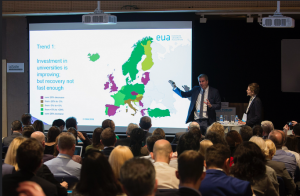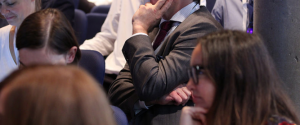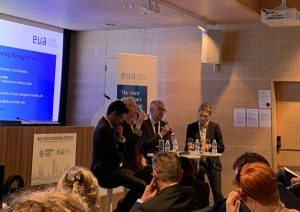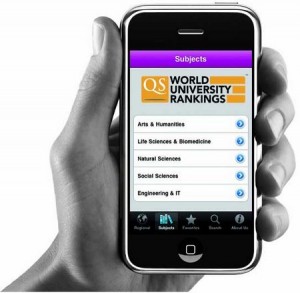Three weeks ago I had a pleasure and amazing opportunity to attend and engage with fantastic research training – the 4th European University Association (EUA) Funding Forum. The forum took place in one BU’s current and established Erasmus+ links – the Universitat Ramon Llull (Barcelona, Spain).
The 4th EUA Funding Forum, titled ‘Frameworks that empower, universities that deliver’ has primarily focused on macro-level changes that affect models and processes that EU universities traditionally apply.
The opening talk by Joseph Garrell I Guiu, Rector of Ramon Llull University (Spain); Jose Manuel Pingarron Carrazon, Secretary General of Universities (Spanish Ministry of Science, Innovation and Universities) and Rolf Tarrach, President of the European University Association, highlighted the roles of Higher Education Institutions (HEIs) in a deeper engagement with social issues. This naturally can be done via education. However, research and business engagement would require different models of thinking in relation to funding. Investments should be attracted from elsewhere and with the purpose of HEIs being at forefront of sustainable living. BU with its new BU2025 vision and strategic plan puts a large emphasis on responsibility. However, to deliver an evidence-based impact would require reconsideration of processes and in many cases steeping out of the HE comfort zone and take risk by implementing different but importantly efficiency-based approaches.
Following the opening talk, Thomas Estermann, Director, Governance, Funding and Public Policy Development at EUA has presented astonishing statistics on how various HEIs within the EU operate in terms of attracting investment and students. Photo below show extract from the slides, presented by Thomas Estermann.

4th EUA Forum, Thomas Estermann
Thomas Estermann stated that the UK has a 20% decrease in attracting any sort of investment that supports HE sector. This is mainly driven by a lesser exposure to funding opportunities that the UK had access to but also nation-wide issues with decreasing student numbers. This left me wondering what can be done to minimise the gap.

Elvira Bolat, 4th EUA Forum
The event took place over two days, 18-19th October, and was an amazing opportunity to meet a frontline of EU HEIs’ leadership. Combination of plenary sessions and masterclasses offered the participants, not only an opportunity to network, but hear stories of ‘brave’ approaches to leading and managing HEIs and to learn about i.e. new types of partnerships within the HE context that can generate funding to support HEIs’ missions or importance of integrating business intelligence systems and management structures to inform HEIs’ processes.
One of my favourite talks was a panel formed by Mikulas Bek, Rector of Masaryk University (Czech Republic); Francisco Jose Mora Mas, Rector of Universitat Politecnica de Valencia (Spain) and Petra Wend, Vice-Chancellor of Queen Margaret University (United Kingdom).

The 4th Funding Forum Plenary Panel I
The panel shared personal professional stories of their HEIs’ journeys in tackling financial uncertainty. It was quite refreshing to see how HEIs are moving, although I must admit this is a slow follow-up on some comprehensive business models, towards evidence-based decision-making via data mining and data-based intelligence. It is uplifting for me to witness the shift in HE leadership mindset, as my and Dr Gelareh Roushan’s PhD student, Claudia Vanzellotti, is exploring how for instance social media intelligence is embedded into small and medium sized enterprises’ (SMEs) strategic decision-making. In era of Big Data HEIs ought to observe trends around own sector but also other related and unrelated contexts which will spark ideas for efficient processes and funding models that will generate impact. Listening to students and open consented online conversations is also something educators should be doing in order to adapt pedagogical models and deliver effective and exciting education experiences.
Overall, attending the 4th Funding Forum had a number of immediate benefits for me:
- Expansion of networks with various organisations (i.e. HEIs, governments, other public organisations and businesses);
- A better understanding of the HE environment, challenges and future areas of consideration, critical for the UK HEIs operating in post-Brexit context;
- Knowledge around the latest thinking in the debate around sources of funding for HEIs – the programme covered sessions around leadership, evaluation of economic impact of research activities, on how to develop income-generating partnerships, on designing institutional efficiency strategy, university management and overview of next generation of EU funding;
- Feeding lessons learned on HE strategic directions into design of new UG and PG programmes across the Business School departments as well as within global engagement models we ought to consider.
Of course following BU’s Fusion I would like to reflect on some teaching and pedagogical lessons I gained from attending the 4th Funding Forum. In particular, I learnt about new TEL tool, Sli.do, that is alternative to Mentimeter and Kahoot and allows engaging large groups of students via Q&A feeders or group discussions to stimulate a better understanding and critical thinking around the content. I already experimented with the Sli.do during several talks in October/November 2018 period and found it easy to use, from both facilitator and audience perspectives. In addition I am planning to use the interviewing / conversational approach to Panel session discussions during the conference that Dr Kaouther Kooli, Dr Julie Robson and I are co-organising with the University of Manouba in Tunis this December.
Last but not least the training, funded by Erasmus+, enabled me to meet and network with the host institution’s colleagues. BU’s Business School has a long lasting and successful relationships in terms of staff and student mobility with the Universitat Ramon Llull (URL). URL is located in fantastic location, Barcelona, and has amazing facilities which are combined by modern architecture and historical buildings.
Quite impressed by Ramon Llull University campus. It is our Business School’s @BUAACSB1 current Erasmus partner so I recommend all students to consider coming and spending a semester abroad here @GlobalBU pic.twitter.com/K6zcm7qY9G
— Dr Elvira Bolat👩🏻💻👩🏻🏫🤳🏻💡🏃🏼♀️🏖 (@Elvira_MLady) October 18, 2018
URL did truly amazing job with hosting the 4th Funding Forum, showcasing its facilities, professionalism of staff and students and warm hospitality of Catalonian capital.
Overall it has been an amazing experience, which will feed into many more exciting professional projects for me personally but also for the Department of Marketing, the Business School and BU. To conclude this post, I would like to leave you with this slide:

The 4th EUA Funding Forum: Presentation by Thomas Estermann
To survive, HEIs need to experiment, expand their external networks and defend their autonomy.
If you wish to experience something new, learn, network and enhance your knowledge in areas of research and/or education, and/or professional practice, I would highly recommend applying for the Erasmus+ Staff Mobility Training funding.
Elvira Bolat, Principal Academic in Marketing (The Business School), e-mail: ebolat@bournemouth.ac.uk













 REF Code of Practice consultation is open!
REF Code of Practice consultation is open! BU Leads AI-Driven Work Package in EU Horizon SUSHEAS Project
BU Leads AI-Driven Work Package in EU Horizon SUSHEAS Project Evidence Synthesis Centre open at Kathmandu University
Evidence Synthesis Centre open at Kathmandu University Expand Your Impact: Collaboration and Networking Workshops for Researchers
Expand Your Impact: Collaboration and Networking Workshops for Researchers ECR Funding Open Call: Research Culture & Community Grant – Apply now
ECR Funding Open Call: Research Culture & Community Grant – Apply now ECR Funding Open Call: Research Culture & Community Grant – Application Deadline Friday 12 December
ECR Funding Open Call: Research Culture & Community Grant – Application Deadline Friday 12 December MSCA Postdoctoral Fellowships 2025 Call
MSCA Postdoctoral Fellowships 2025 Call ERC Advanced Grant 2025 Webinar
ERC Advanced Grant 2025 Webinar Update on UKRO services
Update on UKRO services European research project exploring use of ‘virtual twins’ to better manage metabolic associated fatty liver disease
European research project exploring use of ‘virtual twins’ to better manage metabolic associated fatty liver disease